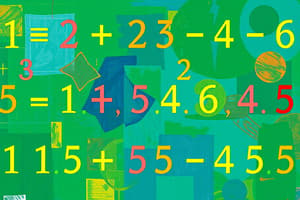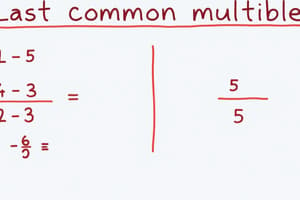Podcast
Questions and Answers
What is the LCM of 4 and 5?
What is the LCM of 4 and 5?
- 15
- 10
- 20 (correct)
- 12
Which method is used for efficiently calculating LCM for large numbers?
Which method is used for efficiently calculating LCM for large numbers?
- Division of the numbers
- Using the GCD (correct)
- Listing Multiples
- Prime Factorization
When could the LCM of a number and 1 be equal to the number itself?
When could the LCM of a number and 1 be equal to the number itself?
- When the number is composite
- Always true (correct)
- When the number is prime
- Only for even numbers
Which statement is true regarding the LCM of two consecutive integers?
Which statement is true regarding the LCM of two consecutive integers?
What is the LCM of 6 and 8 using prime factorization?
What is the LCM of 6 and 8 using prime factorization?
What can be concluded about the LCM in relation to the largest number in a set?
What can be concluded about the LCM in relation to the largest number in a set?
What is the Least Common Multiple (LCM) of 12 and 15?
What is the Least Common Multiple (LCM) of 12 and 15?
Which of the following applications does not involve finding the LCM?
Which of the following applications does not involve finding the LCM?
Flashcards are hidden until you start studying
Study Notes
Least Common Multiple (LCM)
-
Definition: The LCM of two or more integers is the smallest positive integer that is divisible by all of the integers in the set.
-
Importance:
- Used in adding and subtracting fractions with different denominators.
- Helps in solving problems involving multiples and ratios.
-
Methods to Find LCM:
-
Listing Multiples:
- List the multiples of each number.
- Identify the smallest common multiple.
-
Prime Factorization:
- Factor each number into its prime components.
- For each distinct prime factor, take the highest power present in any of the factorizations.
- Multiply these together to get the LCM.
-
Using the GCD (Greatest Common Divisor):
- LCM can be calculated using the formula: [ \text{LCM}(a, b) = \frac{|a \times b|}{\text{GCD}(a, b)} ]
- This is efficient, particularly for large numbers.
-
-
Examples:
- LCM of 4 and 5:
- Listing: Multiples of 4 (4, 8, 12, 16, 20...), Multiples of 5 (5, 10, 15, 20...)
- LCM = 20
- LCM of 6 and 8:
- Prime Factorization: (6 = 2^1 \times 3^1), (8 = 2^3)
- LCM = (2^3 \times 3^1 = 24)
- LCM of 4 and 5:
-
Properties:
- LCM is always greater than or equal to the largest number in the set.
- LCM of any number with 1 is the number itself.
- The LCM of two consecutive integers is their product.
-
Applications:
- In real-life scenarios such as scheduling events that repeat at different intervals.
- In solving problems in number theory and algebra.
-
Practice Problems:
- Find the LCM of 12 and 15.
- Calculate the LCM of 9, 6, and 15 using prime factorization.
- Use the GCD to find the LCM of 28 and 42.
Least Common Multiple (LCM)
- Definition: LCM is the smallest positive integer divisible by all integers in a set.
- Importance:
- Essential for adding and subtracting fractions with varying denominators.
- Useful in problems involving multiples and ratios.
Methods to Find LCM
- Listing Multiples:
- Generate multiples for each number and find the smallest common one.
- Prime Factorization:
- Break down each number into prime factors.
- For each unique prime factor, select the highest exponent found in any factorization.
- Multiply these highest powers together to calculate LCM.
- Using the GCD:
- Use the formula: [ \text{LCM}(a, b) = \frac{|a \times b|}{\text{GCD}(a, b)} ]
- Particularly efficient for large numbers.
Examples
- LCM of 4 and 5:
- Multiples: 4 (4, 8, 12, 16, 20...) and 5 (5, 10, 15, 20...).
- Result: LCM = 20.
- LCM of 6 and 8:
- Prime Factorization: (6 = 2^1 \times 3^1), (8 = 2^3).
- Result: LCM = (2^3 \times 3^1 = 24).
Properties
- LCM is at least as large as the largest number in the set.
- The LCM of any number with 1 equals the number itself.
- For two consecutive integers, LCM equals their product.
Applications
- Useful in scheduling events with different recurring intervals.
- Important in number theory and algebra problem-solving.
Practice Problems
- Find the LCM of 12 and 15.
- Calculate the LCM of 9, 6, and 15 using prime factorization.
- Use the GCD to determine the LCM of 28 and 42.
Studying That Suits You
Use AI to generate personalized quizzes and flashcards to suit your learning preferences.




